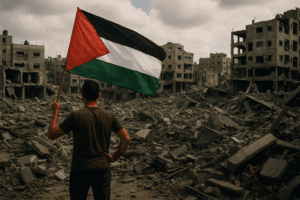The Disarmament Deadlock: Why Hamas’s Statehood Demand Reveals Gaza’s Unbreakable Cycle
Hamas insists disarmament is non-negotiable without achieving an independent Palestinian state with Jerusalem as its capital, framing weapons as essential to their resistance identity. This hardline stance follows collapsed ceasefire talks and clashes directly with Israel’s core demands for total Hamas disarmament and Gaza’s demilitarization before any political resolution. U.S. envoy Witkoff’s claim of Hamas’s willingness to disarm contradicts their public position, highlighting a critical disconnect in negotiations.
Meanwhile, Gaza’s catastrophic humanitarian crisis intensifies pressure on Israel. Witkoff promotes a U.S.-Israeli reconstruction plan as a path to end the war, but its success hinges on bridging the fundamental, seemingly irreconcilable gap: Hamas views arms as its only leverage for statehood, while Israel sees eliminating Hamas’s military power as an absolute prerequisite. This deadlock leaves civilians tragically trapped between maximalist positions.

The Disarmament Deadlock: Why Hamas’s Statehood Demand Reveals Gaza’s Unbreakable Cycle
The latest declaration from Hamas leadership is both a strategic revelation and a sobering reality check: No independent Palestinian state, no surrendered weapons. This uncompromising stance, issued after failed ceasefire talks, underscores why the Gaza conflict remains intractable despite international pressure. But beneath the headlines lies a complex web of political survival, humanitarian catastrophe, and conflicting endgames.
The Core Stalemate, Decoded
- Hamas’s Existential Calculus: Their statement frames weapons as inseparable from Palestinian sovereignty. Surrendering arms without statehood isn’t compromise—it’s surrender. This positions Hamas not merely as militants, but as resistance custodians. For a group weakened but not destroyed by Israel’s offensive, this demand is their last leverage.
- Israel’s Non-Negotiables: Netanyahu’s government insists on total disarmament and demilitarization before discussing political solutions. They view Hamas’s statehood demand as a delaying tactic, fearing armed groups would operate within any new state. The priority remains “absolute victory” and hostage return.
- The U.S. Envoy’s Contradiction: Steve Witkoff’s claim that Hamas is prepared to disarm clashes directly with their public stance. This disconnect suggests either:
- Backchannel negotiations exploring concessions Hamas won’t admit publicly, or
- A significant misreading of Hamas’s fundamental objectives by the U.S. team.
The Humanitarian Pressure Cooker
Witkoff’s visit coincides with Gaza’s accelerating crisis:
- Israel’s Mounting Scrutiny: As starvation and disease spread, global condemnation shifts increasingly toward Israel’s restrictions on aid. Witkoff’s Gaza tour signals U.S. awareness that humanitarian collapse threatens any diplomatic progress.
- Reconstruction as Leverage? The envoy’s “very, very good plan” for Gaza’s rebuilding hints at a potential pathway: trading massive international investment for Hamas’s demilitarization. But this requires Hamas to relinquish its core identity – and Israel to accept some form of post-Hamas governance.
The Unspoken Truths & Stakes
- Hamas’s Survival vs. Statehood: Does Hamas truly prioritize statehood, or is this a shield to preserve its armed role? History suggests the latter. A disarmed Hamas likely ceases to exist as a relevant entity.
- Israel’s Impossible Choice: Can it eliminate Hamas without causing irreversible humanitarian damage that radicalizes future generations? The military and moral costs are escalating daily.
- The U.S. Dilemma: Trump’s team wants a pre-election win but faces Hamas’s maximalism and Netanyahu’s hardline coalition. Their “good plan” remains vague, lacking public Palestinian support or clear mechanisms.
What Comes Next: Beyond the Rhetoric
The path forward is perilously narrow:
- A Grand Bargain? (Unlikely) Hamas disarms in stages contingent on internationally guaranteed statehood talks. Israel accepts a reformed Palestinian Authority in Gaza. Requires unprecedented trust.
- Pragmatic Ceasefire: (More Plausible) A limited hostage deal pauses fighting, allows massive aid, and kicks political talks down the road. This avoids the core disarmament-statehood clash but perpetuates the cycle.
- Continued War: (High Risk) Israel intensifies operations in Rafah. Hamas holds firm. Humanitarian collapse triggers regional escalation. A lose-lose scenario.
Hamas’s statement isn’t just a negotiation position; it’s a mirror reflecting the conflict’s root failure: the unresolved question of Palestinian self-determination. Until this is addressed through credible political engagement alongside security guarantees, weapons will remain Hamas’s only currency, and Gaza’s suffering will persist. Witkoff’s reconstruction plan, however well-intentioned, risks being another temporary fix unless it tackles this Gordian knot. The world watches as civilians pay the price for this profound, enduring disconnect.
You must be logged in to post a comment.